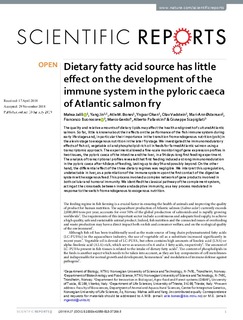| dc.contributor.author | Jalili, Mahsa | |
| dc.contributor.author | Jin, Yang | |
| dc.contributor.author | Bones, Atle M. | |
| dc.contributor.author | Olsen, Yngvar | |
| dc.contributor.author | Vadstein, Olav | |
| dc.contributor.author | Østensen, Mari-Ann | |
| dc.contributor.author | Buonocore, Francesco | |
| dc.contributor.author | Gerdol, Marco | |
| dc.contributor.author | Pallavicini, Alberto | |
| dc.contributor.author | Scapigliati, Giuseppe | |
| dc.date.accessioned | 2019-09-24T11:15:02Z | |
| dc.date.available | 2019-09-24T11:15:02Z | |
| dc.date.created | 2018-12-06T15:20:55Z | |
| dc.date.issued | 2019 | |
| dc.identifier.citation | Scientific Reports. 2019, 9 (27), 1-16. | nb_NO |
| dc.identifier.issn | 2045-2322 | |
| dc.identifier.uri | http://hdl.handle.net/11250/2618468 | |
| dc.description.abstract | The quality and relative amounts of dietary lipids may affect the health and growth of cultured Atlantic salmon. So far, little is known about their effects on the performance of the fish immune system during early life stages and, in particular their importance in the transition from endogenous nutrition (yolk) in the alevin stage to exogenous nutrition in the later fry stage. We investigated the immunomodulatory effects of fish oil, vegetable oil and phospholipid-rich oil in feeds for farmed Atlantic salmon using a transcriptomic approach. The experiment allowed a fine-scale monitoring of gene expression profiles in two tissues, the pyloric caeca of the intestine and the liver, in a 94 days-long first feeding experiment. The analysis of transcriptional profiles revealed that first feeding induced a strong immunomodulation in the pyloric caeca after 48 days of feeding, lasting up to day 94 and possibly beyond. On the other hand, the differential effect of the three dietary regimes was negligible. We interpret this upregulation, undetectable in liver, as a potentiation of the immune system upon the first contact of the digestive system with exogenous feed. This process involved a complex network of gene products involved in both cellular and humoral immunity. We identified the classical pathway of the complement system, acting at the crossroads between innate and adaptive immunity, as a key process modulated in response to the switch from endogenous to exogenous nutrition. | nb_NO |
| dc.language.iso | eng | nb_NO |
| dc.publisher | Nature | nb_NO |
| dc.rights | Navngivelse 4.0 Internasjonal | * |
| dc.rights.uri | http://creativecommons.org/licenses/by/4.0/deed.no | * |
| dc.title | Dietary fatty acid source has little effect on the development of the immune system in the pyloric caeca of Atlantic salmon fry | nb_NO |
| dc.type | Journal article | nb_NO |
| dc.type | Peer reviewed | nb_NO |
| dc.description.version | publishedVersion | nb_NO |
| dc.source.pagenumber | 1-16 | nb_NO |
| dc.source.volume | 9 | nb_NO |
| dc.source.journal | Scientific Reports | nb_NO |
| dc.source.issue | 27 | nb_NO |
| dc.identifier.doi | 10.1038/s41598-018-37266-3 | |
| dc.identifier.cristin | 1639980 | |
| dc.description.localcode | Open Access This article is licensed under a Creative Commons Attribution 4.0 International License, which permits use, sharing, adaptation, distribution and reproduction in any medium or format, as long as you give appropriate credit to the original author(s) and the source, provide a link to the Creative Commons license, and indicate if changes were made. The images or other third party material in this article are included in the article’s Creative Commons license, unless indicated otherwise in a credit line to the material. | nb_NO |
| cristin.unitcode | 194,66,10,0 | |
| cristin.unitcode | 194,66,15,0 | |
| cristin.unitname | Institutt for biologi | |
| cristin.unitname | Institutt for bioteknologi og matvitenskap | |
| cristin.ispublished | true | |
| cristin.fulltext | original | |
| cristin.qualitycode | 1 | |

